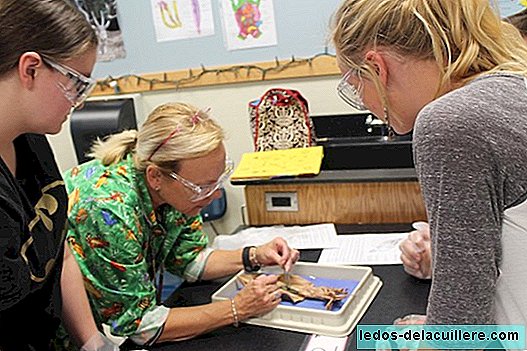The theme of fashion in education these days is the Blink Learning campaign on real influencers, which aims to claim the importance of the figure of the teacher in society. As a high school teacher, I understand that the campaign has a very good intention, although I did not quite fit very well that the video in question uses that terminology or compares us with the youtubers of the moment ...
But leaving aside the term "real influencer" and the YouTube issue, I think if the campaign is positive, invites debate and reflection. In fact, it is true that a teacher can awaken in his students the interest in learning, at least a certain subject, and can guide the construction of that learning if he manages to motivate the students and the students. So I have wondered what qualities that teacher or that teacher will have that can be considered by his students as a "real influencer" and a few ideas have occurred to me.
Have a passion for what is taught and ability to convey that passion. The first thing students notice is that we love what we are telling them and that, at the very least, arouses in them the curiosity to know why we like them so much. It is also up to us to know how to show you the funniest and most attractive aspects of what we like so much, so that they also get bitten by the bug. Even so, we are never going to get it with everyone, being honest, the same teachers, no matter how passionate we feel, we love some subjects but we hate others, although normally we are not saying it very loudly out there.
Stay up to date with tastes and trends, within limits, it is essential for everything that follows. But we must not go too far, however modern a teacher may be, for boys and girls it is still a teacher and by definition old and somewhat boring, so if it is a modern one it gets out of hand, it could to become ridiculous ... But if we can show that we are aware of characters, expressions or fashions in general, maybe we can surprise them and, precisely so, get their attention.
Master ICT and in particular social networks. At this point, we should all be clear that the internet, the tablet or the mobile phone are part of our daily life, whether we want it or not, everyone's, including teachers and students. So it is enough to prohibit the use of mobiles in the classroom and the is that I'm older for this, because if we are a teacher we have to have the ability to learn how to use, if necessary, even Snapchat ... Well, I confess that with Snapchat I have not been able to, but I am willing to try again.
Devote time to lifelong learning which is directly related to the above. If we want to be up to date and we want to master ICT we have to train, either with face-to-face courses, with online training plans or attending meetings and conferences. You have to see what others do, learn and be inspired to be able to improve teaching activity every day and to really be the engines of educational change that much of society is crying out for.

Contextualize the proposed activities It's something we have to improve. In my subject, physics and chemistry, all my life the problems of free fall have begun by: "A pot is dropped from the top of a roof ..." Well look, no! The idea is not good, that context is boring and not suitable. We must create other wider contexts, which give more play, more realistic and closer to students. It is worth that some of us like to make equations, derived and integral for the pleasure of calculating, but it is that we are geeks ... for a good part of the students the thing will have more grace if the context in which the activities are presented is appropriate.
Enjoy sharing time and space with children and young people. This is another key, if you hate children, please do not become a teacher! I know what you are going to say to me: You have many vacations ... Well yes, look, it's true, we have more than in other professions, but for something it is. During school hours there are missing eyes and hands to attend to those 20 or 30 children who are your responsibility and who permanently claim your attention. In addition, beyond school hours, I do not keep track of the hours I work, some days are more, others are less, but I am sure that if I do global computing more than 8 daily are.
Connect with students sharing experiences to break that barrier between the waxed area and the desks. Although we live permanently with the Damocles sword of learning standards about us, from time to time we have to put the brakes on the content of the subject and stop for a while to talk about more trivial topics. There are moments like yard times, guard hours when a teacher is missing, or days when for some reason only part of the student attends class, which are ideal for talking to students in their lives, about ours and To share some experiences.
Know how to listen because they and they also have a lot to say. Normally we are in such a hurry with the idea of developing all the contents of the curriculum that we don't even talk. We release our roll and only admit questions about specific questions related to the subject. So much so that it is not difficult to verify as as students increase their level, in general, they ask less and less and that is also very bad. It is not about letting them break our class or distracting attention on purpose, which is also a technique that some use, but when they need to talk we have to sit down and listen to them just as we like to be heard from time to time.

Be willing to learn from students because they can contribute to a whole different point of view from ours and, not always, but sometimes that can give us a vision of things that can also help us build our own learning. In addition, boys and girls are the only ones who can teach us how to use Snapchat, our friends don't know either, so that is also an important aspect to consider.
Don't forget that we all pass by. Correct me if I am wrong, but I think that most of the teachers have been children and students before and we have been in class, we have smoked in a bathroom, we have forgotten our homework, we have spoken in class when the teacher sent silence, we have given ourselves notes ( because we didn't have whastapp)… Well, I don't, I haven't done any of this because I was very studious, serious and responsible, but surely many professors do and it is something that occasionally is fine to remember.
Finally sure that cool teacher does not put in his Twitter bio something like real influencer because, as we said before, our students will laugh if we go out of style. So the best thing will be that all this is between us and that our students do not know that we assemble these films to see if we can get Pythagoras' theorem to grind them. Luckily in this case, they read little press and few blogs, but that also means that we will also have to rethink the ways that older people have to communicate.
However, I personally do not believe that all the above features are necessary at the same time. A teacher can positively influence his students by the passion he transmits by guiding the learning of his subject without needing to be a great connoisseur of ICT. Nor are teachers the only real influencers, fundamental in that sense is the role of the family. Few influencers imagine better than grandparents, thanks to his extensive experience in life, and most have no idea what Snapchat is.












